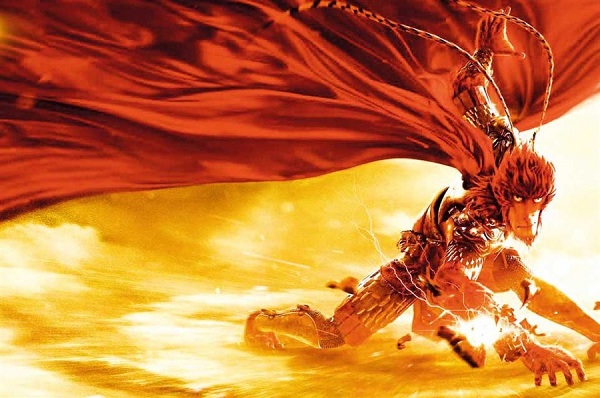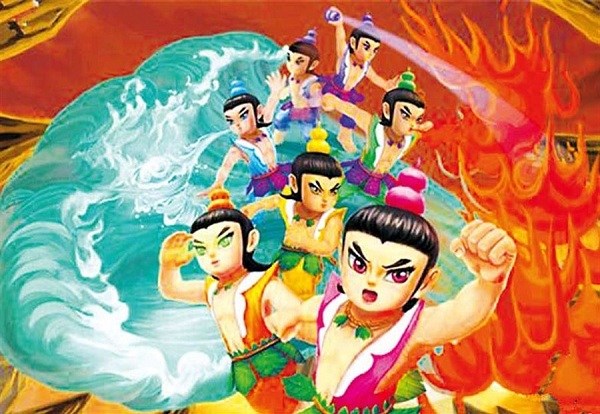
Timeless myths and old-fashioned marketing

Human resource specialist Jenny Huang loves animated movies. Until recently though, it was mostly cartoon blockbusters from Hollywood that captivated her attention.
Like many other viewers in the world's second-largest film market, Huang saw fresh potential in China's animation scene last summer with the smash success of "Monkey King: Hero Is Back." Now, as animated fantasy film "Big Fish and Begonia" makes waves at local theaters, she's convinced China is on the cusp of a golden age of animated cinema.
"It's a beautiful and sentimental work with distinctive Chinese style and elements," Huang says of the new film. "When I was in the cinema, I felt very proud that original Chinese animation can also be made so exquisitely."
Huang is one of millions in China who have seen the movie, which has been garnering praise for its impressive visuals and depiction of Chinese culture.
Perhaps even more impressive though is the story behind the film's creation. Directors Liang Xuan and Zhang Chun spent more than a decade creating this epic. And when money for the production began to run dry, the duo turned to crowd-funding. The film's end credits includes a list of 4,000 backers who came forward to help finance the film.
The movie also received financial support from Enlight Media. Like Huang, producers at Enlight also spotted promise in homegrown animation after the release of "Monkey King: Hero Is Back" and decided to help Liang and Zhang bring their film to the big screen.
"The long list of the film's investors, many of whom are ordinary Internet users in China impressed me a lot," Huang adds. "It shows how eagerly Chinese movie buffs have been waiting to embrace a burgeoning and thriving animation industry of our own."
China's domestic cartoon industry flourished in the 1950s and early 60s, when local animators pioneered novel filmmaking techniques and created classic films like "Havoc in Heaven." The 1980s marked another high water mark for local cartoons, many classic examples of which were broadcast in mini-series format.
In recent years though, despite explosive growth in China's film market as a whole, local animators working on the big-screen have struggled to match their more experienced overseas peers, both in terms of artistry and box-office results, making examples like "Big Fish and Begonia" and "Monkey King: Hero Is Back" all the more remarkable.
Journey of life
"Big Fish and Begonia" draws from a melange of myths and legends mentioned in ancient texts like "Chuang-tzu," "Classic of Mountains and Seas" and "In Search of the Supernatural."
Set in an undersea fantasy world, the film centers on a young girl named Chun who is saved by a boy at the cost of his own life. To give him life again, Chun must protect the boy's soul — in the form of a tiny fish. Only when the fish is big enough can Chun release it back into the sea, where it will eventually return to life as a human.
To many, Liang might seem like an unlikely helmer for such a project. After dropping out of the prestigious Tsinghua University in 2005, Liang founded B&T Studio with his friend Zhang, then a student at the university's Academy of Arts and Design.
According to Liang, the film is about the journey all beings make through life. As for its fantastical setting and storyline, he says these took shape as he studied Chinese mythology more than a decade ago.
"Our film has deep roots in the profound culture and philosophy of China," says Liang, who was in charge of the film's screenplay. "Compared with foreign animations, it has a very different way of storytelling. Many ancient philosophies in China are romantic, imaginative and inspiring. Some of these subjects are well-suited to explore through animation."
Zhang, who mainly worked on the movie's visuals and production, says it's also a story about perseverance, dedication and reunion.
Many credit the movie's emphasis on Chinese elements and artistic motifs as a major reason for its popularity. These include scenes inside a traditional tulou (giant earthen round houses typical of Fujian Province) as well as its visuals of dragon boats, Chinese opera and lotus lanterns.
"It is a sentimental film with touching and beautiful scenes," says Luna Lu, who also watched the film. "It is the most exquisite and artistic domestic animated film I have ever seen. It is a sign that Chinese animation is reviving after a long-time weak position compared with its foreign counterparts."

Market timing
Some industry insiders see a more mundane factor behind the movie's success: good timing.
July is typically a month reserved for domestic releases. And with no other strong animated films to compete against, "Big Fish and Begonia" was uniquely positioned to capitalize on the buzz generated from its visually-stunning trailers and attention-grabbing funding model.
Made at an estimated cost of 20 million yuan (US$2.9 million), the film has already pulled in some 500 million yuan at local theaters. By comparison, last year's "Monkey King: Hero Is Back" earned 956 million yuan, making it the highest-grossing Chinese animated film of all time.
Despite its impressive financial results, many viewers have slammed the film's plotting, characters and editing. Some critics have called the storyline "illogical" and "meaningless." Its overall score on film review website Douban now stands at 6.6, down from the 8.2 set in the days after its debut.
"I just can't understand why so many teenage characters in the film decide to sacrifice their own lives for love," says Jeffery Qiu, an administrative manager. "It's unreasonable."
But amid the rekindled interest in Chinese animation, some say the industry still has a long way to go in terms of sophistication and marketing.
Shi Chuan, a film critic and vice president of the Shanghai Film Association, notes that observers shouldn't read too much into the success of a handful of pictures. As Shi sees it, China's animated film output still lags foreign counterparts in terms of originality and technique.
"Domestic animation still suffers from a lack of good original scripts and expertise when it comes to artistry and visual effects," explains Shi.
Indeed, not every recent animated film made in China has been a hit. For example, last summer's "Mr Black: Green Star," based on the cartoon TV series "Black Cat Detective" pulled in a paltry 70 million yuan. Many viewers slammed the quality of the film's animation and criticized it as an uninspired attempt to capitalize on nostalgia for its source material.
Shi adds that ancillary industries which support animated films in major overseas markets are still lacking in China.
"In Japan and the US, there are well-developed industry chains that include comic books, films, video games and theme parks," he explained
Still, he concedes that "Big Fish and Begonia" represents a significant attempt to develop a uniquely Chinese animation aesthetic.
Looking ahead, local studios are betting that Chinese viewers will continue to respond to films that resonate with their culture.
Shanghai Animation Film Studio, for example, recently announced that it's working on a clutch of films inspired by "Avanti" and "Big-Eared Tutu," two animated series which draw heavily from Chinese culture.